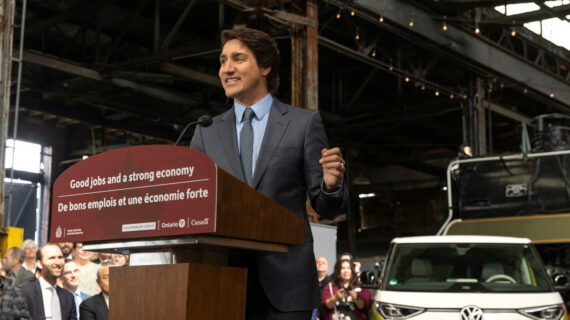- Heading into November of this year, Canadian's were among the most crypto-obsessed people on the planet, searching the topic 1,671,800 times per month according to one study.
- The crash of the cryptocurrency exchange FTX in November resulted in massive losses—roughly $8 billion for depositors—as cryptocurrency values plummeted across the board.
- While some commentators believe this highlights fundamental weaknesses with cryptocurrencies, others are not convinced they are going to disappear altogether. Rather, they just can't be dealt with as you might the traditional banking sector, they say.
This Christmas, giving the gift of cryptocurrency may not make your family as happy compared to years past. Prior to the crash of the cryptocurrency exchange FTX in November, Canada was one of the most crypto-obsessed countries on Earth.
A study conducted at the time by CryptoManiaks found that Canadians searched about crypto-related topics more than nearly every other population on Earth, behind only the Germans, Turks, and the Dutch.
According to the study, there were 1,671,800 searches per month, a number equivalent to 4.3 percent of the Canadian population.
The FTX crash resulted in massive losses for investors as cryptocurrency values plummeted, resulting in roughly $8 billion in losses for depositors. Commentators have speculated that the crash might be the end of the cryptocurrency industry.
Will the crash of FTX and the arrest of founder Sam Bankman-Fried be the end of that Canadian obsession?
Matt Spoke is the founder of the fintech company Move and Hub contributor who has worked in the cryptocurrency industry. He says any loss of enthusiasm from the FTX crash will be temporary, even if he cannot predict how long it will take to recover.
“Obviously in the short term, it’s caused a lot of volatility, a lot of loss of trust. But when one looks at entering the system, there are probably 1000 other bad actors out there that are eventually going to get flushed out every time one of these big headline-grabbing hacks or frauds or thefts or whatever occurs,” says Matt Spoke.
Bankman-Fried faces a plethora of charges in the United States related to FTX, including conspiracy to commit wire fraud, wire fraud, and conspiracy to defraud the Federal Election Commission.
Spoke says that fewer bad actors is a positive development in any industry and that Bankman-Fried’s creation was ironic considering what crypto was intended to become.
“Bitcoin and crypto more broadly promised this decentralized financial world, and FTX was sort of the antithesis to that,” says Spoke. “FTX was this massive honeypot centralized organization where you are effectively depositing money denominated in Bitcoin or Ether or other crypto assets into a bank that has all of the risks associated with being a bank, but without any of the regulatory oversight.”
Nigel Barber, an evolutionary psychologist who has written about cryptocurrencies, says there is no good way to determine the actual value of cryptocurrency, which is risky for investors.
Barber compares cryptocurrencies to the Dutch tulip craze in the 17th century when people spent vast fortunes on quantities of the flowers, despite it lacking any precise value, eventually resulting in the tulip bubble popping and a tremendous wealth wipeout.
“The biggest problem with investing in crypto, or tulips, is that there is not a reliable way of determining valuation,” says Barber. “This means that enthusiasts see the value going skywards whereas skeptics set the value at zero. One consequence of price uncertainty is wild price swings that create speculation.”
Barber says the FTX crash is a real issue for cryptocurrencies because it revealed the shortcomings that result from the same issues of any unregulated currency, such as fraud and deception. He says this can be observed in the FTX scandal, as well as the theft of crypto by criminal entities.
“Crypto is not a reliable store of value and is not secure. These basic confidence issues are not going away,” says Barber. “They cannot be solved by government regulation since effectively there is none.”
Spoke says FTX represented the worst of both worlds, combining the volatility of crypto and the risk of traditional banks but no regulatory oversight.

Nonetheless, Spoke believes cryptocurrencies are not going to disappear.
“I don’t think that FTX really shakes my confidence that there’s value being created in this industry,” says Spoke. “To me, it means that you can’t build services for crypto the way you would have built services for banking or traditional financial products. And when you try to blend these two worlds, it creates these pretty significant blow ups.”
Spoke says wealthier countries like Canada will have more people exposed to alternative investments like cryptocurrencies, and those people will be far more interested.
“There’s a lot of hoops you have to jump through to understand crypto to begin with, and it’s not something that’s all that approachable to people that don’t have a certain level of basic financial sophistication,” says Spoke.
While Canada and Germany are among the countries with the most online searches for cryptocurrency, the countries with the highest levels of actual cryptocurrency investment fall outside the world’s most advanced economies in the G7.
According to CEOWorld Magazine, the United States is just the 14th most invested country in cryptocurrency per capita, with developing economies like Nigeria, Thailand, the Philippines, South Africa, and Brazil falling within the top ten.




